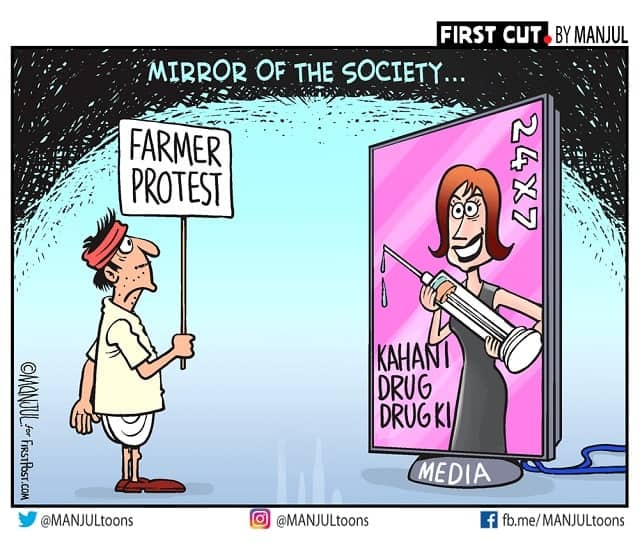Rhea Chakraborty needs to be called a witch because she does witch-craft.”
“Sushant was a victim of Rhea’s black magic.”
Over the past weeks, we have seen the majority of the Indian news channels pose serious allegations like these on actress Rhea Chakraborty, for having a role in the death of actor Sushant Singh Rajput. On June 14, Sushant was found dead at his apartment in Mumbai’s Bandra.
Soon after, the late actor’s family alleged that Chakraborty, Rajput’s girlfriend, had abetted his alleged suicide and registered a case against her in Patna on July 28. Since then, Chakraborty has been the center of relentless attention on news channels and attacks on social media. Chakraborthy is currently in jail for over three weeks on drugs-related charges linked to a probe into the actor’s death.
Several cartoons rightly represent the current state of media.


Concerns of top advertising brands
The rising toxicity, however, caught the eye of the country’s top advertisers. Several industry captains and experts have expressed their concern over the state of India’s news channels, saying the on-going toxicity and unwanted aggressiveness in content doesn’t bode well for advertisers in terms of brand safety.
In a news report by Best Media Info, the advertisers hinted that they would relook at their overall TV news ad-ex if the situation doesn’t improve. “As a viewer and advertiser, I really feel the news channels have stooped to a pathetic state and if the advertisers have the opportunity to break this vicious cycle, they must do it collectively and be a real purpose-driven brand. While doing this, we should state the reason that we are all doing it because of the content. I agree that such an environment is dangerous for any brand because it comes back to hounding it,” said Krishna Rao Buddha, Senior Category Head, Marketing of Parle Products, to the website.
“I’m recommending all the leading advertisers to come together and ban the news genre until they are forced to bring sanity and ethics in news back,” he said. Amul, Future Group and Maruti too have expressed their concern over the rising slander in news content.
“Advertisers would like their brand to be in a safe, reliable and trustworthy environment, and not want to put their ads in an area of negativity. News channels should be mindful of that,” said Ashish Bhasin, CEO, APAC & Chairman Dentsu Aegis Network India, in a live-webinar conducted by Governance Now.
What can the brands do?
Recently, in a case related to Sudarshan TV where the News Broadcasters Association was made a party, the Supreme Court asked the association to come up with suggestions on how it could be given “more teeth” so that it could act against the TV channels for violating program codes or broadcasting something in bad taste.
The brands can coerce the news channels to bring sanity and ethics in news broadcasted, by warning them that they could pull the plug on advertising. Industry experts say that this may force the news channels into a course correction.
Several brands have already reduced their advertising on social media platforms such as Facebook and Twitter, reasoning that the platforms weren’t safe for them because of the rising hate speech and toxicity.
There are also a few important questions that the top brands must nudge the channels to address — Why is it that a Bollywood actor’s unfortunate and mysterious death is more newsworthy than continued rapes in Uttar Pradesh; an economy which has contracted by 24 per cent; ongoing protests by farmers; exponential rise in COVID-19 cases; issues at the border and the continuing arrests of academics and activists?

